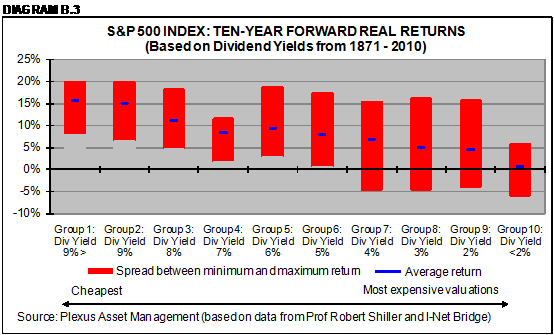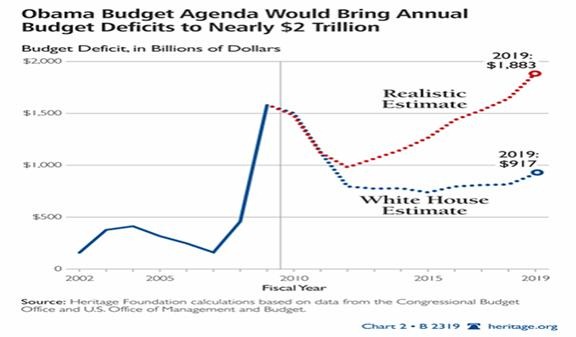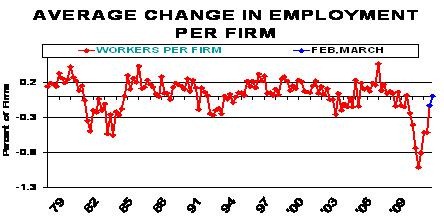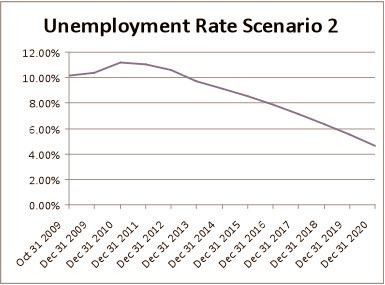Is This a Economic Recovery?
Economics / Economic Recovery Apr 04, 2010 - 10:53 AM GMTBy: John_Mauldin
 Is This a Recovery?
Is This a Recovery?
This Time is Different
The End Game
Some Good News on Unemployment
The Effects of a Tax Increase
Last week I wrote a letter to my kids trying to explain what Greece meant to them. Reader Ken V wrote: "Great letter, John. Now you should write one for the adults who are retired and don't have the long future your kids do. If the US becomes Greece, things won't recover in time for much of the rest of my life to be more than one grim, dreary period. What is your investment advice for those with roughly a 10-year horizon, not 30-40-50 years?"
A very good question Ken, and one that was asked more than a few times. So today I will touch on that thorny issue, as well as look at the employment numbers for what we see about the potential for an actual recovery.
First, let me say that what I am not doing here is giving you, gentle reader, specific advice. To be able to do that I would need to have specific knowledge of your situation, assets, location, needs, health, etc. But what I will try to do is give you a general assessment of what I see for the economy over the next few years and what the investment climate might look like. I am also going to refer to a lot of previous letters I have written, for those of you who want to do further research.
Is This a Recovery?
First, we are in a nascent recovery from the depths of the Great Recession, but the question is "what kind of recovery?" Many suggest that we will see a typical recovery, like we have seen with every recession since World War II. As regular readers know, I don't think we've gone through a typical, garden-variety recession, and to expect a typical recovery is more faith-based than factual. We had a deleveraging recession and we are still deleveraging. The process, as shown in studies I have written about, takes years to conclude.
When I started talking in 2002 about a Muddle Through Economy for the rest of the decade, I had a lot of people giving me a hard time by 2005-6. But as we closed out the decade, average growth of US GDP for the entire decade was less than 2% annualized, which by my definition is Muddle Through. For the US economic machine, that was pretty anemic growth. It resulted in a lost decade for stocks, except for the NASDAQ, for which it was merely a dismal decade. Traditional 60-40 (stocks to bonds) portfolios did not fare well, coming nowhere close to the projections of standard-issue money managers.
I think we are in for yet another Muddle Through period, at least for 5-7 years and maybe for the decade, depending on a few scenarios I will come to in a minute. As my friend Prieur du Plessis outlined for us in last Monday's Outside the Box, if we measure the stock market by either earnings or dividend yields, valuations are in the top 10% historically. Average (!) returns, going out for ten years, are 2.6% real, with some historical 10-year periods being negative. Below is the range of returns, based on dividend yields. It does not look much different from the chart based on earnings. We are currently at the far right-hand bar.

This does not suggest a happy outcome for those who espouse buy-and-hope portfolios, at least not if you have expectations or needs of 7-8% or more.
This Time is Different
If you are a new reader, I suggest going to the archives at http://www.2000wave.com/archive.asp and searching on the name "Rogoff," to read the letters I have written on his and Carmen Reinhart's must-read book, This Time is Different, which shows us that it is never different this time. They looked at 266 financial crises in over 60 countries across a span of 200 years.
Debt crises have sadly similar conclusions: they always end in pain and tears. And although we have stopped, as private citizens, from accumulating debt (or in some cases, such as mortgages, have just walked away from the debt), our national government has stepped into the breach and is borrowing at mind-boggling levels.
Below is a chart that is a wonderful illustration of an economic truth: if something can't happen then it won't happen. We cannot borrow $15 trillion in the next ten years. Not at anywhere near the low interest rates we enjoy today, and probably not even at nosebleed rates. (Note that the chart was created before the health-care reform bill. Add at least another trillion to the total. Anyone who thinks that bill was revenue neutral is kidding themselves.)

The End Game
Something has to change. We have two paths to choose from. We can either slowly bring the US budget deficit back into balance (or at least to a level less than the growth in nominal GDP) or we can continue on the current path and become Greece or Japan. (Again, go the archives and search for "Japanese Disease".)
The first choice is a bad one, but the latter choice would be disastrous. If we take the first choice, which I call the Glide Path Option, a meaningful reduction would have to be on the order of $200-250 billion a year. That, along with reduced spending by state and local governments could (and probably will) amount to reducing spending by a little more than 2% of GDP.
I have written several letters on the equation GDP = C (consumer and business consumption) + I (investments) + G (government spending) + E (net exports) (again, searchable). The Keynesians point out that when "C" is reduced in a recession, "G" should be increased to offset the effects of reduced consumption. And they are correct that a deficit will help overall GDP in the short run.
But we are coming to the end of the Debt Supercycle. There are limits to what even the US government can borrow, and the sooner we recognize that as a nation the better off we will be in the long run.
But if we start to reduce our deficits (the "G"), it will be a short-term drag on GDP. There is no way around it. That means that if inflation is 2% and we have a reduction in "G" of 2% of GDP, then the nominal growth in GDP will have to be 6% in order to achieve after-inflation growth of 2%. Two percent as in Muddle Through.
But wait, John, didn't we just grow at 5.6% last quarter? Why are you being so gloomy? For several reasons. First, the growth was largely statistical. Part of it came from inventory accounting, as inventories had got as low as they could go. Note that an increase in inventories will increase GDP but possibly result in a lower future GDP as the excess inventory is depleted. And inventories are still rising, but not by as much.
Secondly, a significant portion of the increase in GDP came from the stimulus. As noted above, an increase in "G" will be reflected in current GDP. This stimulus begins to go away in the second half of the year, and I think there is little reason to believe there will be anything other than an extension of unemployment benefits past two years, by way of "stimulus" this year.
I rather think the last half of the year will show a slowing (though still positive) economy. Unemployment will be closer to 10% than 9% at the end of the year, as the large number of temporary census workers will no longer be employed by the government.
Some Good News on Unemployment
The good news is that employment rose by 162,000 jobs last month, with about 48,000 of those being census workers and another 82,000 coming from the birth/death ratio, a way of guessing how many new businesses are started. The birth/death ratio is eventually squared up when we get real statistics, but it will be several years before we know the true picture. So, while the headline is good, the reality is not quite as good. But let's take what we can. The direction is positive, and it should get better over time.
Small businesses have at least stopped laying people off, according to my friend Bill Dunkenberg, chief economist of the National Federation of Independent Business. The improvement is due to fewer reductions in jobs, not gains in new hiring.

There are not a lot of job openings, according to the survey that goes along with this note from The Liscio Report: "The probability of a person unemployed in February finding a job in March fell to from 20.1% to 18.7%, an all-time low for this series (which goes back to 1948).
This reenforces a letter I wrote last November, talking about the prospects for longer-term employment rates. Even the rosy scenarios still have unemployment above 8% in four years. That assumes a total of 1.5 million new jobs can be created this year and two million every year thereafter, with no recession.

Remember, we need about 125,000 new jobs a month to just keep up with the growth in our population. Though if you look at today's employment release, they added a whopping 398,000 people to the civilian labor force (a huge number when compared to the 162,000 new jobs - a discrepancy you didn't read about in any report.). What kept the unemployment rate from rising significantly was that they deducted 238,000 people who are no longer considered unemployed, due to the fact that they have given up looking for jobs. The U-6 unemployment rate rose to 16.0%, however. The U-6 rate includes people who have part-time work but wish they had full-time work. That part-time number rose above 9 million again this month, in a rather large monthly jump.
You can read the whole November letter and see the other two scenarios.
The Effects of a Tax Increase
I have written about the effects of tax increases in several letters. Basically, tax increases have a negative impact on GDP of three times the size of the tax increase. (Again, in the archives, search for "Romer", as in Christina Romer, Obama's head of the Joint Council of Economic Advisors and co-author with her husband of the research).
Taxes may be going up by as much as 2% of GDP in 2011, when you include state and local increases. This could be as much as a 6% drag on GDP over the next three years (probably somewhat front-loaded).
So, let's add it up. We will likely see a reduction in government spending (from all levels) over the next few years, a really nasty set of tax increases, which will hit small businessmen the hardest, and continued high unemployment, and all of it coming in a weakening economy by the end of the year.
I put the odds of a double-dip recession in 2011 at better than 50-50. Not a sure thing, as maybe sanity flowers and they phase in the tax increases over 3-4 years. Plus, the American economy and businesses are more resilient than we think, and it is possible we Muddle Through 2011. Not much growth, but perhaps we avoid that recession.
Deflation in the US is the dominant force. There is little likelihood today of a worrisome increase in inflation. I have written letters about why this is the case. (Search for "elements of deflation" and "velocity"). Actually a little inflation (2-3%) might be welcome as a protection against slipping into outright deflation, if we slow down next year.
Let's try to sum it up. We have a Muddle Through Economy this year (not much more than 2% overall growth for the year), with a slowing economy next year. Unemployment stays high. If we get our deficits under control, we lock in a slow-growth economy for 5-6 years, but after that we could get back on track. A recession puts that brighter outlook out a little farther. Unemployment would go north of 12%. I might note that the stock market drops an average of 40% during a recession.
Or we do not get our deficits under control. We can go on borrowing for a lot longer than most of us think. But the Rogoff and Reinhart book makes clear that there is an end. You can't solve a debt crisis with more debt. Ask Greece in about 6-12 months, as the "fixes" are temporary. Things go along until there is a loss of confidence in the bond market, and then all hell breaks loose. When is that? Who knows? But it is not ten years away, and probably not five. Rates skyrocket and the currency takes a hit.
And then we are presented with a conundrum. Would the Fed really enable the government to run huge deficits by monetizing the debt? It would be a crisis decision. If they just stand by, interest rates soar and the economy goes into recession or worse. If they print, we could see inflation and a crashing dollar, with rates soaring. As I said above, this would be a disastrous scenario. I think we avoid it, as there will be a growing backlash at the polls against government deficits. But then I am an optimist. If you think the politicians cannot muster the will to make the cuts, then bet on the disaster scenario. Think gold and hard assets and foreign assets and absolute-return funds.
But optimist though I am, I can't rule out disaster. So, either we have a slow-growth economy for 5-6 years, or we hit the wall all at once. Think depression if it's the latter. Either way, it's a tough investment environment.
So, how about those with a 10-year time frame, like the reader I opened with? First, lengthen your time frame. There are some amazing new medical therapies coming your way and you are likely to live longer. I would plan on it. You will need more than you think you will.
Second, really think about your commitment to equities in general. By that I mean the usual index funds. If you have (or your manager has) some real skill in picking stocks, then that is different. But I think it is very possible we'll see another lost decade for stocks in the US. If we do have a recession next year, the world markets are likely to fall in sympathy with ours. At the bottom, it is quite possible that emerging-market stocks will finally decouple from the developed world, so for those who should be in stocks (those with a longer time horizon), think about going beyond the developed world.
For most of you, caution is appropriate. Do not plan to make 8% a year from your portfolio, or to spend 7% of your savings. As Ed Easterling has shown, there are historical periods where people taking 5% a year from their portfolios would be left with nothing after 30 years. In fact, about 50% of those portfolios would run out of money in an average of just over 20 years. The key? Starting valuations. http://www.crestmontresearch.com/pdfs/Stock%20Retirement%20SWR.pdf
For most people already retired, a fixed-income portfolio should be your first choice. High-quality corporate bonds, high-quality state and municipal bonds (do your homework - don't trust the rating agencies!), and a "ladder" of not not more than 4 years. I know that does not yield much, but you should be protecting your principal.
If you have enough income from a portion of your assets to live on, then think about absolute-return-type funds.
Ken, if your time horizon really is ten years, then safety should be your number-one objective.
Also, I know some people are managing their wealth for the next generation. That may make my note of caution not as emphatic, assuming you really do have enough to make your expected time horizon and more.
All that being said, I am still bullish about certain businesses. As I noted a few weeks ago, I see an opportunity in bleeding-edge software consulting for media and other businesses that have to innovate or die, and I'm investing in such a startup. I am also investing in small-cap biotech stocks, with a 10-year horizon. Remember that birth/death ratio? While I do not believe it is as high as they estimate, there are businesses being started all over the country. That is what a free market does.
If I had the stomach to deal with renters, I would be buying distressed homes at prices where I could more than make a reasonable return. For some of you, that may be a way to get income. (Commercial real estate will soon become a real potential as well, for experienced investors.)
The US economy is not coming to an end. There will be lots of opportunities, but it will be harder than in the past. More like swimming through peanut butter. But nothing is ever easy. For the next few years, I simply think being more cautious makes sense - but choose your targets. There are funds and managers I like.
A 10-year time frame? There is not much I can say that will make you happy. 20 years? That should be another thing. One way or another, this deficit crisis will resolve itself, and then we can get back to doing what we do best.
The Health Chair, Phoenix, San Diego, and New York
Speaking of new businesses, I was in Albuquerque yesterday visiting rock-star dentist Gary Sanchez. He has designed what I think is the best chair I have ever sat in, and I have bought dozens in a search of something to help my sore back as I sit in front of the computer all day. Gary's side business in the Health Chair has become quite successful, even in today's economy. If you have something people want, it will sell. I highly recommend the chair for those of us who sit at desks all day. You can learn more about it at www.thehealthchair.com/jmep.html.
And why Albuquerque for a dentist? It turns out I needed a lot of work done - seems you should get your fillings replaced every 20 years, especially if you have the old amalgam fillings. The local dentists I talked with wanted to do a lot of sessions. Gary would sit me down and do it all in one seven-hour session, while I was out, and do it a lot cheaper than local estimates. And he is a helluva nice guy, and the flight is quick and cheap. Nice website for a dentist, too: http://www.sanchezdental.com/
Next Wednesday I fly to Phoenix, where I speak at a Thunderbird School conference, then off to La Jolla where I will attend Rob Arnott's annual Research Affiliates conference through Sunday, then home for an evening before I take off to New York, where I do some speeches and media and even an interview with Steve Forbes, which I am really looking forward to. And all the while reading and keeping up and writing.
It's time to hit the send button. Have a Great Easter. We will gather a lot of the kids for Sunday brunch, which I look forward to. Right outside my office door is a picture of Tiffani and Melissa when they were 5 and 3, in their Easter dresses. They were so cute! And now it is almost 30 years later, and granddaughter Lively will be all decked out at 4 months old. It goes so fast!
Your enjoying the times analyst,
By John Mauldin
John Mauldin, Best-Selling author and recognized financial expert, is also editor of the free Thoughts From the Frontline that goes to over 1 million readers each week. For more information on John or his FREE weekly economic letter go to: http://www.frontlinethoughts.com/learnmore
To subscribe to John Mauldin's E-Letter please click here:http://www.frontlinethoughts.com/subscribe.asp
Copyright 2010 John Mauldin. All Rights Reserved
John Mauldin is president of Millennium Wave Advisors, LLC, a registered investment advisor. All material presented herein is believed to be reliable but we cannot attest to its accuracy. Investment recommendations may change and readers are urged to check with their investment counselors before making any investment decisions. Opinions expressed in these reports may change without prior notice. John Mauldin and/or the staff at Millennium Wave Advisors, LLC may or may not have investments in any funds cited above. Mauldin can be reached at 800-829-7273.
Disclaimer PAST RESULTS ARE NOT INDICATIVE OF FUTURE RESULTS. THERE IS RISK OF LOSS AS WELL AS THE OPPORTUNITY FOR GAIN WHEN INVESTING IN MANAGED FUNDS. WHEN CONSIDERING ALTERNATIVE INVESTMENTS, INCLUDING HEDGE FUNDS, YOU SHOULD CONSIDER VARIOUS RISKS INCLUDING THE FACT THAT SOME PRODUCTS: OFTEN ENGAGE IN LEVERAGING AND OTHER SPECULATIVE INVESTMENT PRACTICES THAT MAY INCREASE THE RISK OF INVESTMENT LOSS, CAN BE ILLIQUID, ARE NOT REQUIRED TO PROVIDE PERIODIC PRICING OR VALUATION INFORMATION TO INVESTORS, MAY INVOLVE COMPLEX TAX STRUCTURES AND DELAYS IN DISTRIBUTING IMPORTANT TAX INFORMATION, ARE NOT SUBJECT TO THE SAME REGULATORY REQUIREMENTS AS MUTUAL FUNDS, OFTEN CHARGE HIGH FEES, AND IN MANY CASES THE UNDERLYING INVESTMENTS ARE NOT TRANSPARENT AND ARE KNOWN ONLY TO THE INVESTMENT MANAGER.
John Mauldin Archive |
© 2005-2022 http://www.MarketOracle.co.uk - The Market Oracle is a FREE Daily Financial Markets Analysis & Forecasting online publication.



